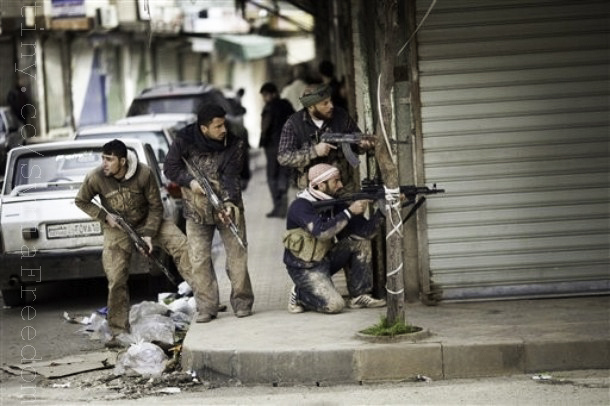As has been the case from the beginning, options for intervention in Syria go from bad to worse and the limited meddling by countries on either side is simply prolonging the conflict.
Dr. Florence Gaub, a researcher at the NATO Defense College, writes at the Carnegie Endowment for International Peace that outside forces can’t end the Syrian civil war. Critically, a political settlement is implausible so long as either side believes they have the upper hand. And, thanks to foreign support, both sides are so emboldened.
“A continuous supply of weapons to both sides—whether from Russia, Iran or the Gulf States—only maintains the parties’ perception that fighting is a better option than negotiating,” Gaub writes. “This explains why, in terms of statistical probability, an external supply of weapons lengthens a civil war.”
This has been known for some time. Hawks in Washington continue to advocate for direct arming of the Syrian rebels (despite ties to officially designated terrorist organizations and documented war crimes), clueless to the fact that the meddling already happening is precisely what has made the conflict so protracted and bloody to begin with.
Kofi Annan, the former UN and Arab League special envoy for Syria, said prior to quitting the post that while Russia had received a lot of criticism for continuing to back the violent President Bashar al-Assad’s regime, “very few things are said about other countries that send arms and money and weigh on the situation on the ground.”
“Syria indeed has become an arena for outside meddling, but the meddling has been far more effective at sustaining the fighting than ending it,” said a report last year from the International Crisis Group. “Because the mission’s success was predicated on finding middle ground when most parties yearned for a knockout punch, few truly wished it well, even as no one wanted to be caught burying it.”
UN rights chief Navi Pillay has condemned the continued flow of weapons from foreign powers to both sides in the Syrian conflict. “The ongoing provision of arms to the Syrian government and to its opponents feeds additional violence,” she said in the text of remarks made to the Security Council. “Any further militarization of the conflict must be avoided at all costs.”
Beyond the proxy war that Syria has become, Gaub writes, direct military intervention “would simply make things worse,” and would not have legitimacy under international law.
The White House has reportedly rejected proposals to directly arm the rebels, a decision Obama is apparently reconsidering. But the US and its European allies have been indirectly aiding the rebels, while their allies in the Arab Gulf states – along with the flow of Libyan arms – are providing weapons. The policies of Washington’s client states are to a large extent the responsibility of Washington, of course. Furthermore, Western support to the opposition has caused the Assad regime’s backers, cautious not to cede a geo-political win to the US, to dig in their heels.
A resolution to the bloodletting is easily within reach, but for the insistence to meddle from the outside.




